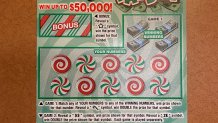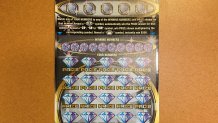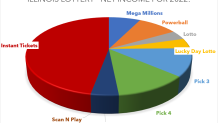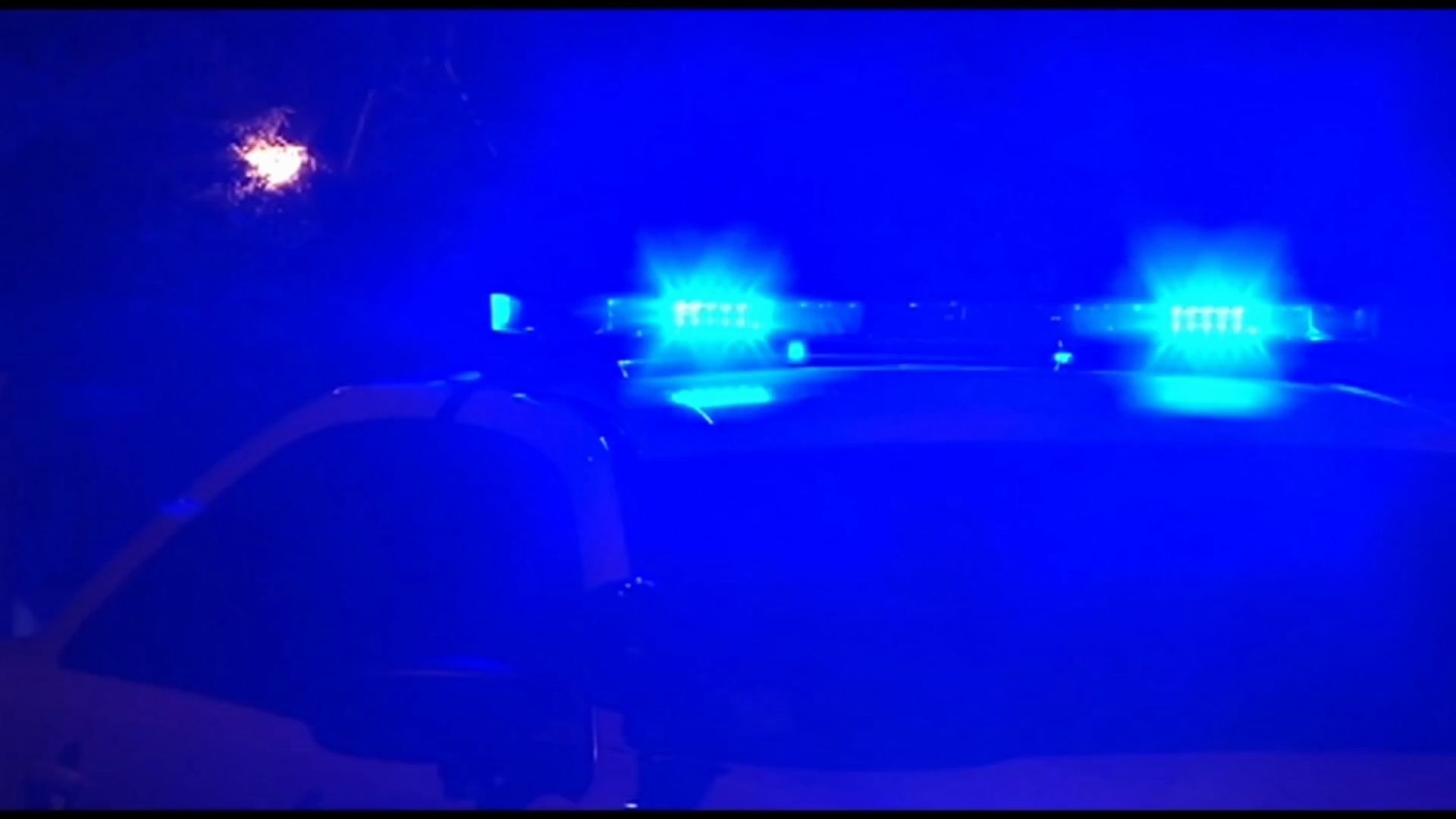On any given day, there’s an array of Illinois Lottery scratch-off tickets you can buy for $1 to $30 a ticket.
These instant-ticket games have varying top-dollar prizes, and you can purchase them in vending machines and convenience stores throughout the state. The state’s current instant games are at this link, including:
“Peppermint Payday," currently highlighted as a “featured ticket”, costs $3 and says, “Win up to $50,000!”

“Pyramid of Gold," also a “featured ticket,” costs $10 and says, “Win up to $500,000.”

$5 Million Riches," advertised on the lottery’s website, costs $30 per ticket and says, “Win up to $5,000,000!”

But NBC 5 Investigates has found that the top-tier prizes for all these three tickets were claimed weeks ago. Yet, as of Tuesday, the lottery still is actively marketing them online, and they’re still for sale at retailers in Chicago and the suburbs.
- “Peppermint Payday, which says, “Win up to $50,000!” No. Now the most you can win is $1,000.
- “Pyramid of Gold” - $10 a ticket: “Win up to $500,000” No. Now the most you can win is $10,000.
- “5 Million Riches” - $30 a ticket: “Win up to $5,000,000!” No. You can’t even win the second-biggest prize of $100,000. The most you can win now is $20,000.
Feeling out of the loop? We'll catch you up on the Chicago news you need to know. Sign up for the weekly> Chicago Catch-Up newsletter.
Over the past month, NBC 5 Investigates has been tracking 12 instant ticket games that the Illinois Lottery has continued to sell for weeks – after all the top prizes were claimed.
Local
It’s something the Illinois Lottery readily acknowledges. For one thing, it discloses at this site all the top prizes that have been claimed and cashed in for every game. And every lottery ticket has fine print on the back warning that “instant tickets may continue to be sold even when all top prizes have been claimed.”
But many people don’t know about the website or don’t have the means to check it whenever they want to buy a ticket. And many ticket-buyers don’t see the written disclaimer until after they’ve bought the ticket.
“When you’re buying a Mega Millions ticket or a Powerball ticket, the odds are infinitesimal, but you have actual odds of winning,” said historian Jonathan Cohen, author of the new book “For a Dollar and a Dream: State Lotteries in Modern America." “But when you’re buying a scratch ticket that promises a $1 million jackpot, and it turns out that $1 million jackpot has already been won by someone in Evanston, then you have, actually, no chances of winning … and it’s only by going on their website and scrolling down and opening up tab seven and seeing that two of the prizes have been won – that, to me, seems just an extra level of unfairness.”
NBC 5 Investigates showed these games to people outside a lottery retail store.
“That’s a rip-off,” said Annyce Leonard. “If someone already claimed the ticket, then why do you keep selling them just to keep people’s money?”
“You’re deliberately kind of tricking people into buying these,” said Christine Nieves. “I think they should take them out of circulation.”
A spokesperfor the Illinois Lottery said the lottery follows its Instant Game Closure Policy."
Meghan Powers told NBC 5 that the lottery wants to “ensure consistency in how games are identified for clean-up and how and when that message is communicated and carried out by our staff."
“Clean-up occurs when the top prize tickets are claimed by the players,” Powers said. “Once a Clean-Up Memo is issued, our Lottery Sales Representatives, who regularly visit our retailers every three to four weeks to service them, collect tickets that are to be returned.”
Powers did not detail how long that process takes, but the Instant Game Closure Policy says the goal is to have “all unsold game tickets returned from retailers within 10-12 weeks after the start of the [Clean-Up] process.”
That implies that a ticket could be on sale for nearly three months with no top prizes available.
NBC 5 Investigates requested an on-camera interview with a lottery official, but, to date, no one has been available because the office is in the middle of a legislative session, Powers said.
The Illinois Lottery contracts with a company called Camelot Illinois to run its games. And instant tickets are by far their biggest money-maker.
NBC 5 Investigates examined the lottery’s financial statements and found that scratch tickets netted $572,360,575 in 2022 – nearly as much as all other lottery games combined.

“Scratch tickets are the bread and butter of state lottery commissions,” said Cohen.
And it could be argued that it’s in the financial interest of the state – and Camelot – to keep selling instant tickets when they know they won’t have to pay out any more large sums in prizes.
But what about the claims printed on each ticket that someone can “win up to” a certain amount, even though they no longer can?
“[It’s] just like classic false advertising,” said ticket-buyer Michelle Dibiase.
“Just trying to reel you in to get you to play,” said her friend Shawn Eden.
“Just tell the truth: Hello!” said Cindy Parker.
“One would think that Federal Trade Commission truth-in-advertising laws would restrict the kind of deceptive advertising we see with lotteries,” Cohen said. “But state lotteries, because they are state-run agencies, are exempt from [those] laws.”
NBC 5 Investigates found that exemption has confounded several plaintiffs in class-action lawsuits in other states – including Texas, California, and New Mexico – who have sued their own state lottery systems for selling scratch tickets with no top prizes left. None of these lawsuits, which were filed between 2000 and 2015, were successful.
And although the Illinois Lottery is overseen by the Illinois Lottery Control Board, Cohen said that’s not enough, since the Control Board itself is a state agency.
“It really speaks to the problem in the design of the lottery system in general,” Cohen said. “There is no oversight over the Illinois Lottery from an organization or entity that does not have a financial interest in the Illinois Lottery making more money. That’s what lotteries do not have and what … would have frankly solved a problem like this.”



